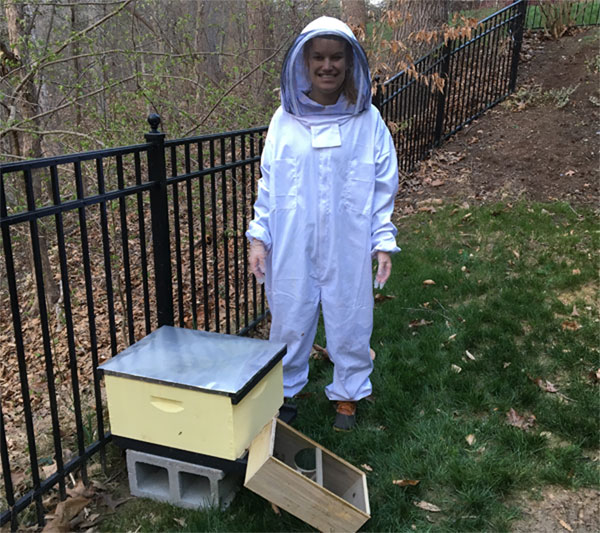The Wakefield Bee Brigade-they’re the bee’s knees
Wakefield students are working to combat a major environmental problem

Photo Courtesy of Tracy Taylor
Tracy Taylor supervises her beehive that she assembled herself.
What’s all the buzz about? The Wakefield Bee Brigade of course! The student members of the Bee Brigade sweeten the community by housing bees in various places around Raleigh. Saving the bees is an important responsibility because bees have a significant role in spreading the seeds of many plants, including food crops.
The students who are part of the Bee Brigade are concerned with the rapid decline of the bee population. In order to fight this problem, these students are providing multiple “bee boxes” throughout the community in order to give the bees a sanctuary.
“Saving the bees is important to me because bees are one of the most important and beneficial species in the world; a significant portion of our food depends on their pollination,” senior Bee Brigade member Camryn Blawas said.
These students hold a passion for saving the bees because they feel that bees are a key part in sustaining the environment and agriculture of the world.
“I’m passionate about helping the bees because I really want to give our planet some love. I think that if everyone does a small part in making the earth greener we will see a difference over time. I just love nature and plants so it’s fun to see my garden improve too!” senior Bee Brigade member Tracy Taylor said.
The Bee Brigade’s goal isn’t only to positively impact bees; students and teachers involved in the organization find that their spirit lies in improving the environment in general.
“I enjoy knowing we are giving back to the environment,” Melissa Schug, science teacher and advisor of the Bee Brigade said.
Not only are these students enthusiastic about helping the environment, they are also creative. Some members of the Bee Brigade decided to decorate their “bee boxes” in order to give their bee friends a colorful home.
“Mrs. Schug told us about Bee Downtown which is a Durham-based company that works on educating and spreading the word about bee-related issues. Bee Downtown puts rooftop beehives in Durham that are really beautifully painted, so I decided to paint mine too,” Blawas said. “I got the design, which is basically a bunch of different types of flowers, from an artist I follow on Instagram.”
Unfortunately, housing bees is not free. Jodi Riedel, the agriculture teacher at Wakefield High School, applied for and won a grant that allowed Wakefield to acquire the funds needed to start the Bee Brigade club.
“[We won] the Burroughs Wellcome Fund Grant,” Riedel said. “I wanted to apply for [the grant] because it would give me a lot of latitude to do projects that wouldn’t be possible without the funding.”
Although the senior members are sad to soon be leaving the bees that they raised so carefully, they know that it is not the end of their bee careers.
“I hope that I’ll be able to get people I meet in college interested in beekeeping or at least aware of everyday things they can do to help bees, like planting bee-friendly plants or buying sustainably sourced bee products,” Taylor said.
The Bee Brigade doesn’t only help bees; keeping bees helps other animals and the environment. The organization has introduced a new passion to the school community.
“It has just been a really good experience,” Schug said. “It has been amazing watching the kids learn and get excited about beekeeping.”








Rick Laughlin, APLD • May 24, 2017 at 12:04 am
Sounds pretty simple…stop spraying all of the pesticides to save our pollinators, our environment and our bees, butterflies and hummers!